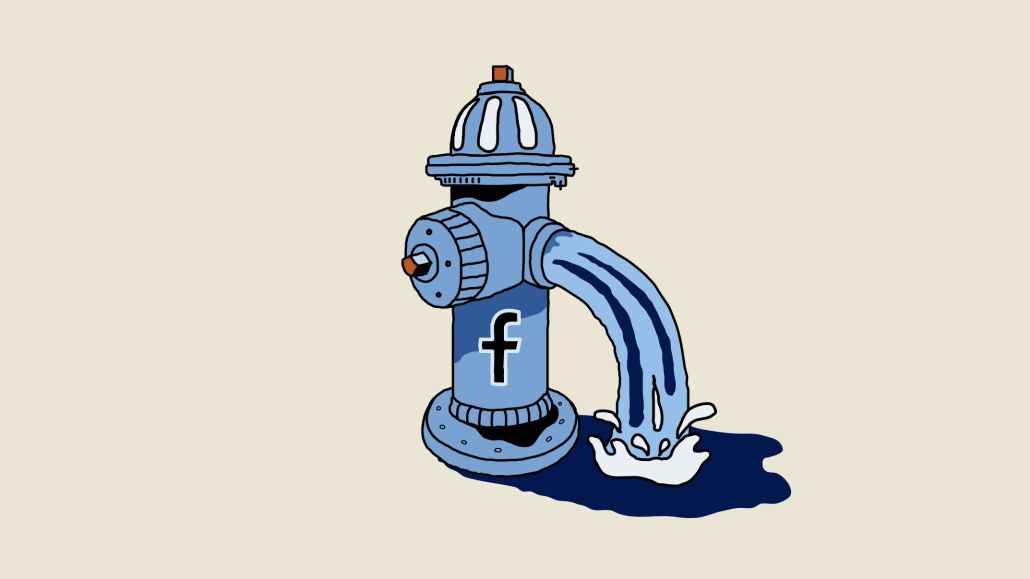Secure your place at the Digiday Media Buying Summit in Nashville, March 2-4
The Rundown: Facebook recommends spending your way through its measurement problems

Take comfort, beleaguered advertiser: Facebook has heard your concerns about its advertising measurement challenges.
It advises you to keep spending money on Facebook and to scrutinize the performance of that investment less frequently.
The social platform yesterday took the unusual step of publishing a blog post acknowledging the challenges with measuring the effectiveness of ads marketers are running on Facebook.
These challenges emerged after Apple rolled out App Tracking Transparency as part of iOS 14.5, which asks iPhone users to opt in to having their activities tracked by apps they’d installed. Estimates by third party analytics firms including Flurry suggest that only about a quarter of iPhone users agreed to the tracking.
The key details
- Facebook estimates it is under-counting the number of conversions happening on iOS devices by about 15%, though that percentage differs by product and ad category.
- Facebook’s post suggested a number of remedies. They included measuring effectiveness at the campaign level, rather than the creative level; enabling a Conversions API, which allows advertisers to directly share their own first-party sales data directly with Facebook; analyzing the effectiveness of the advertising less frequently; and trying out different measurement solutions.
- Facebook said it will continue to improve its conversion modeling, which it has been working on all year. It also plans to work with partners to provide more visibility into conversions on sites whose domains advertisers do not own.
A bumpy ride
When Apple announced it would give its device users the ability to opt out of being tracked thanks to ATT, Facebook was one of the companies that complained loudest. Its CEO, Mark Zuckerberg, talked about it during earnings calls. The company published full-page ads in many of the country’s largest newspapers, describing Apple’s plans as damaging to small businesses.
While Facebook didn’t win many new supporters by caping up for small businesses, the recent effects of Apple’s change, which were pushed to the majority of its iPhone user base this summer, have been pronounced. Patrick Coddou, the CEO of the consumer goods company Supply, shared a Twitter thread Monday of what he said were complaints from different small business founders of the significant drops in Facebook’s ad effectiveness.
Facebook has made several changes this year to prepare. It switched to a default seven-day window for conversions, and added conversion modeling numbers to those results where that was possible.
…That everybody will keep riding
As tumultuous as things have been, the measurement challenge obscures two truths that most marketers admit grudgingly: That Facebook ads work, and there are few viable alternatives for those looking to stop using it.
“The idea that the ads don’t work any more is plainly wrong,” said Darren D’Altorio, the head of social at the digital agency WPromote. “Even though we can’t granularly measure it anymore, we know that it works.”
The changes also align with recommendations that many agencies have been making for Facebook advertising for a while, away from intra-day optimization and more toward longer-term planning. “Automation has become a core tenet of Facebook over the past three to four years,” said Avi Ben-Zvi, vp of paid social at Tinuiti.
Ben-Zvi added that Tinuiti is tracking a 39% year-over-year increase in advertising on Facebook this year
More in Marketing

Thrive Market’s Amina Pasha believes brands that focus on trust will win in an AI-first world
Amina Pasha, CMO at Thrive Market, believes building trust can help brands differentiate themselves.

Despite flight to fame, celeb talent isn’t as sure a bet as CMOs think
Brands are leaning more heavily on celebrity talent in advertising. Marketers see guaranteed wins in working with big names, but there are hidden risks.

With AI backlash building, marketers reconsider their approach
With AI hype giving way to skepticism, advertisers are reassessing how the technology fits into their workflows and brand positioning.







